|
Marsh Green
Edenbridge
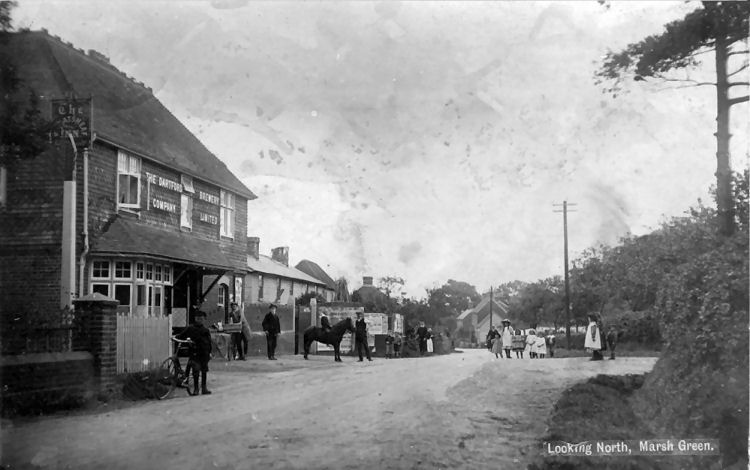
Above postcard, 1909. |

Above postcard, 1909, kindly sent by Rory Kehoe. |
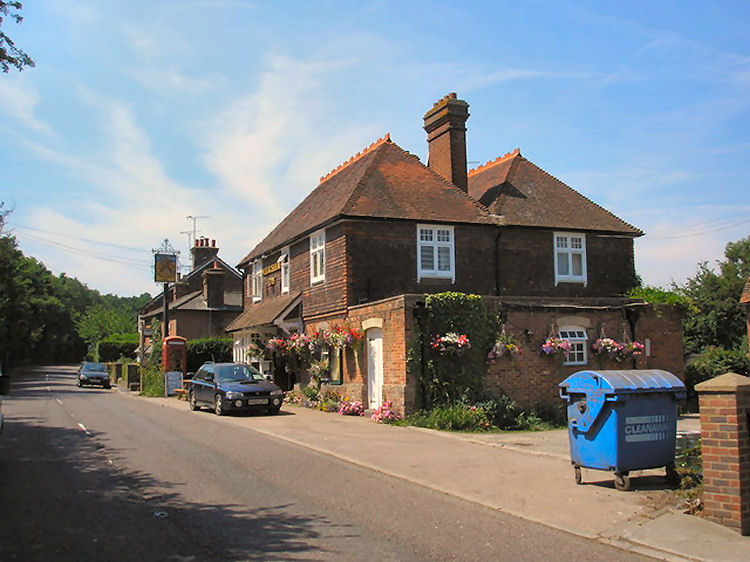
Above photo, 2006. |
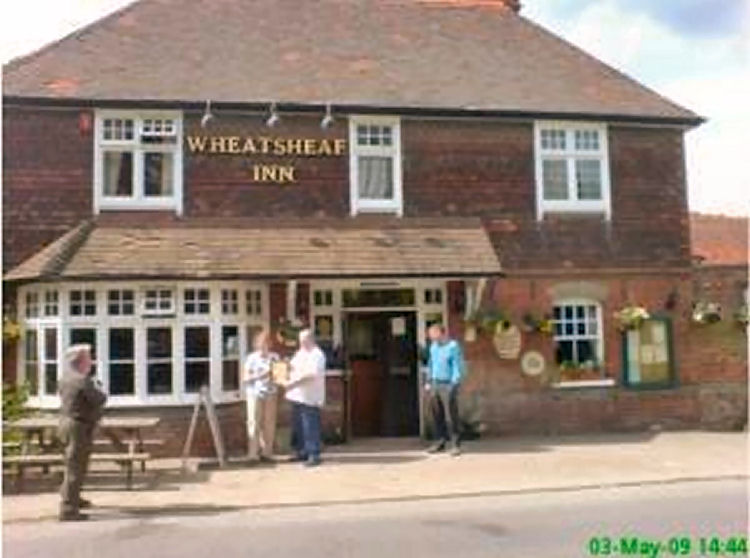
Above photo May 2009. |
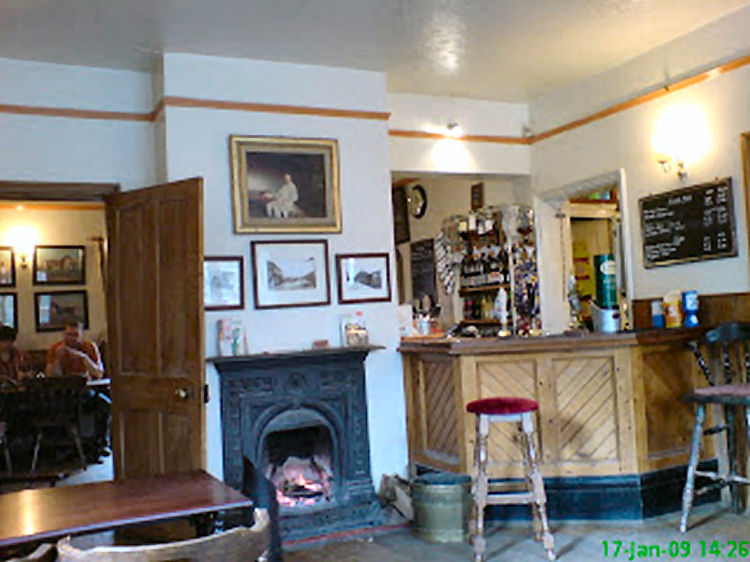
Above photo, January 2009. |
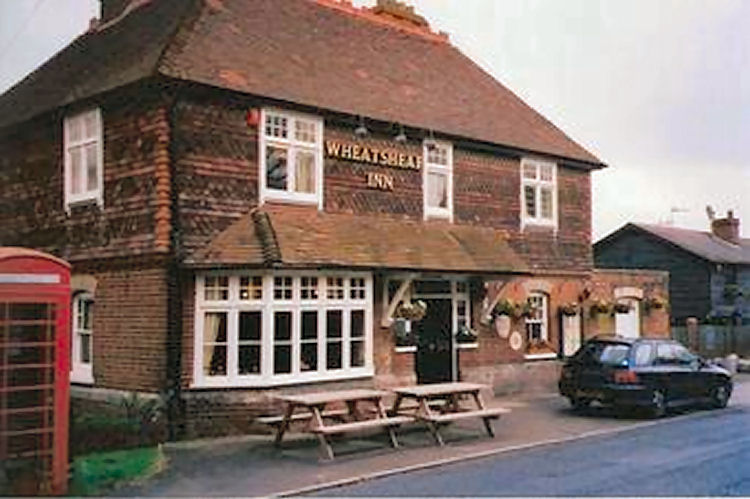
Above photo date unknown. |
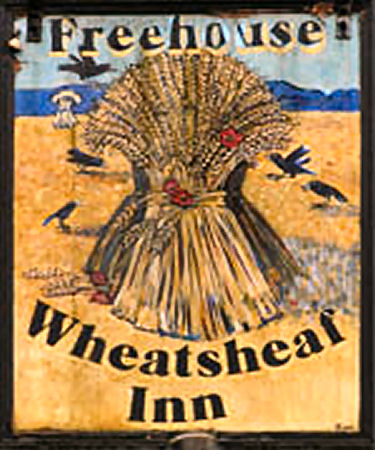
Above sign 2007. |
The 1841 census gives Ambrose Bryant aged 45 as being a show-maker of the
same address.
Although Ambrose only appears to have ran the beer-house for three years
the 1861 census give a Thomas May as running a pub, possibly this one in
that year, unfortunately no name of the pub was given. I am assuming it is
this till proved otherwise.
|
South Eastern Gazette 05 September 1848.
SEVENOAKS. BENCH OF MAGISTRATES. - LICENSING DAY.
Ambrose Bryant applied for a license for a house called the "Wheatsheaf",
at Marsh Green, in the parish of Edenbridge. The application was
supported by a strong array of local authorities, including the
minister, churchwardens, surveyors, overseers, etc., and many owners of
property in the parish. It appeared that the "Wheatsheaf" was situated
two miles from the nearest licensed house, and that the traffic had
lately considerably increased, owing to the proximity to the railroad.
The answers to the inquiries of the magistrates being satisfactory, and
no opposition being offered, the license was granted.
|
|
Kentish Gazette, 2 April 1850.
BRYANT v. LEIGH.
This was an action for seduction.
Mr. M. Chambers and Mr. Simmons were for the plaintiff Mr. Serjeant Shee
and Mr. Creasy for the defendant.
Mr. Chambers said that the plaintiff in this action was Ambrose Bryant,
an innkeeper at Edenbridge, in this county, and the
defendant was Henry Leigh, who carried on the business of farmer,
surveyor, and land agent, in the same neighbourhood; and the
action was brought to recover damages from the defendant for having
seduced Mary Anne Bryant, the daughter of the plaintiff.
It would appear that there had been no intimacy between the parties
until the month of August, 1847, and at this time the plaintiff’s
daughter was about 24 years old, and the defendant nearly 50. In that
month the young woman had gone on a visit to a relation,
and upon her return by the train the defendant got into the same
carriage, entered into conversation with her, asked permission to
accompany her home, and expressed his intention to visit her on the
following day. He did so, and from this time an intimacy sprang
up between them, and the defendant was a constant visitor at the house
of the plaintiff, and he repeatedly promised to marry the
daughter.
In the month of January, 1848, the plaintiff was unfortunately from home
upon business, and the defendant took advantage of the
opportunity afforded by his absence to overcome the scruples of his
daughter, and succeeded in accomplishing her ruin, and the
result was that she became in the family way. The defendant continued to
profess honourable intentions, and upon one occasion he
fixed the period for the marriage, but postponed it upon some excuse of
business, and he went so far as to give the young woman
money to purchase a wedding ring. At length she entertained a suspicion
that he was upon intimate terms with a widow lady named
Stevens, residing in the same neighbourhood, but upon her taxing him with
it he indignantly denied it, and asserted that he would
never marry any other woman than herself. The suspicion, however, turned
out to he well founded, for shortly afterwards the
defendant married this lady, and upon an application being made to him
to make some reparation for the injury he had inflicted
upon the plaintiff and his daughter, he very coolly remarked that she
ought to affiliate the child; and he afterwards said that he had
consulted his lawyer, and he would rather spend £200 than settle the
matter or make any compensation.
The learned counsel then stated that the young woman was delivered of a
child, which was still alive, in the month of October, 1848,
and he said, that owing to the conduct of the defendant towards the
young woman shortly before, and which would he detailed to
them in evidence, her delivery was of the most painful description, and
for six months afterwards she suffered most severely from
illness; and, under these circumstances, the plaintiff came before a
jury to obtain compensation in damages from the defendant for
the very serious injury he had received at his hands.
Mary Ann Bryant confirmed the above statement, and added the following
particulars:— There were four other children at present
living at home. Her mother died eight years ago, and since her death
witness had managed the domestic business of the house, and
she was to be paid £14 a-year wages. Knew the defendant, who is a
farmer, builder, and surveyor of timber. He occupies five farms.
The defendant told her that he was upwards of fifty years of age. This
was before her misfortune. On the 18th of January, 1848, her
father was away from home on business, and she and three brothers were
left in charge of the house. The defendant came in about
seven o’clock, and remained until two o'clock the next morning; and in
the course of that evening he told her that he fully intended
to make her his wife, and there was no one else he could be happy with,
and she unfortunately yielded to his solicitations. The
family were all gone to bed; this took place in a little back parlour.
The defendant, after this, appeared more attentive than before,
and visited her more frequently, and she believed more than ever that he
intended to make her his wife. The defendant afterwards
asked her to go to London to get married, and she consented to do so as
soon as she could prepare her dress. The defendant said
her clothes would do, and she then told him to appoint his own time and
she would be ready, and he said the marriage should take
place at the end of a fortnight; but when the time arrived he made an
excuse for not going, as he had business with a gentleman
named Streatfield, to whom he was agent. After this he continued his
visits, but kept postponing the day for the marriage. In August
she saw the defendant driving by in his cart with a widow lady named
Stevens, and she reproached him for doing so. He told her
not to fret, and said he could not bear to see her weep. Witness said
she could not help it, as he was deceiving her, and she had
heard he was going to be married to Mrs. Stevens. The defendant replied,
"No, my dear, it is not likely I shall leave my babe and
you." Witness continued crying, and said if her father came to know it,
he would banish her for ever, and she had no mother to take
her part. The defendant, upon this occasion, told her that he had £2,000
besides his farming business, and he cried, and said he
would never marry any one else. Shortly after this conversation the
defendant called her attention to the report of a trial for
seduction-. "Brown v. Yardley"— and asked her what she thought of it,
and she replied that she thought it was very cruel, and the
defendant said he should be ashamed to treat any young woman so. On the
5th of October the defendant was at her father's house,
and he wanted to kiss her, but she told him she would not permit him to
do so while he carried that widow woman about in the
manner he did. The defendant said he should never think of having Mrs.
Stevens while she lived. At this time she was far advanced
in pregnancy, and the defendant said if it was a boy it should have his
name, and if it was a girl it should be christened Martha,
which was his mother's name. She told him she should never live to see
it, and the defendant became angry, and shook her, and
squeezed her violently. In consequence of this violence she was taken
very ill, and was obliged to go to her bed; and on the 20th of
October she was confined of a male child. She continued ill for upwards
of six months, and was unable to do any work, and during
this period she had a nurse and medical attendant, and was supported by
her father.
Mary Jenner proved that she nursed the daughter of the plaintiff during
her confinement, and that she was in attendance upon her
from October, 1848, to the succeeding January, and during that period
she said that she was unable to do anything for herself or to
assist in any way in the household affairs.
Samuel Munday, a schoolmaster at Edenbridge, deposed that in October,
1849, he went to serve a writ of summons upon the
defendant, and he asked him not to do so at that lime, as his wife was
by, and also to try and hush up the matter; and he said he
thought the plaintiffs daughter ought to have affiliated the child, and
not have brought an action. The defendant made an
appointment to meet him lhe same evening, but he did not keep it; and he
could not serve the writ upon him for several days; and
when he did so, the defendant said he had consulted his lawyer, and his
money was all tied up, and he would spend £200 rather
than settle the matter. The widow Stevens, who at this time was married
to the defendant, was present, and she said she had given
orders to the workmen on the farm not to go to the plaintiff's
public-house, on pain of dismissal; and she added, that the action
should not do him any good.
This was the plaintiff's case.
Mr. Serjeant Shee then addressed the jury for the defendant, and said
that the defence he was instructed to offer, and which
according to those instructions, he was bound to lay before them was,
that the statement of the plaintiff's daughter with regard to
the conduct of the defendant was not true, and that, in point of fact,
no such intimacy or connexion as that which had been spoken
to by her had ever taken place between them. The case rested entirely
upon the evidence of the young woman herself; there was
not the slightest attempt at corroboration. If, however, the jury should
think that they could place reliance upon the evidence of the
daughter of the plaintiff, it appeared to him that they must be of
opinion at the same time that this was not a case of deliberate
seduction; but that the defendant by going lo the house of the plaintiff
to take refreshment had fallen into company with this young
woman, and that she had listened to his improper proposals, and was as
much to blame as he was, and that in such a case a very
small amount of damages would cover the injury that had been sustained
by the plaintiff in the present action.
Mr. Justice Maule having summed up, the jury, after a very short
deliberation, returned a verdict for the plaintiff:—
Damages £200.
|
|
South Eastern Gazette 18 November 1851.
INSOLVENT DEBTORS.
To be heard at the Sessions House, Maidstone, before the Judge of the
County Court of Kent, on Tuesday, the Second day of December, 1851, at
Twelve o'clock at noon precisely.
Ambrose Bryant, formerly of Marsh-green, Edenbridge, Kent, shoemaker and
farm labourer; then also a beer-seller; and late of the "Wheatsheaf"
public-house, at Marsh-green, aforesaid, licensed victualler and
shoemaker.
|
|
From the Maidstone Telegraph and West Kent Messenger, 18 December 1869.
Tunbridge Intelligence. PETTY SESSIONS.—TUESDAY.
Before Sir David Salomons (in the chair), Major Scoones, C. Powell, Esq,
and A. Powell, Esq.
TRANSFER OF LICENSES.
An application was made by Mr Shorter executor to the late Mrs May,
formerly landlady of the “Wheatsheaf Inn,” Edenbridge, for the transfer
of the license to Mr John Peters.
Supt. Dance said there had been no complaint against the house.
The Bench granted the application.
|
|
From the Kent and Sussex Courier, 25 August, 1876.
ALLEGED LICENSING OFFENCES.
Thomas Longley, landlord of the “Wheat Sheaf” public-house, Marsh Green,
Edenbridge, was summoned for unlawfully selling intoxicating liquor to a
drunken person (John Shee, the man committed for manslaughter), at
Edenbridge, on the 8th inst.
Mr Rogers, solicitor, applied for a remand, in order that witnesses
might be summoned to give evidence on behalf of the defendant, and the
application was granted.
|
|
From the Kent and Sussex Courier, 30 August 1876.
MARSH GREEN: THE RECENT CASE OF MURDER.
Thomas Longley, landlord of the "Wheat Sheaf Inn," Marsh Green,
Edenbridge, was summoned for selling intoxicating liquor to one John
Shee, on the 8th August, he being drunk.
Mr Rogers defended.
Thomas Beckett said the man Shee called at the defendant's public-house
between seven and eight o'clock, and remained there till three minutes
to ten o’clock. Shee appeared to be the worse for drink when he arrived
at the house. The defendant served him with a pint of beer, but he could
not say whether Shee was served with any more drink that evening, but
the man was drinking there all the evening. Shee sat quietly on the
bench outside the house, and did not interfere with any one.
In answer to Mr Rogers, witness said he believed Shee was drunk because
he "rossled" up against another man when he sat down on the bench.
John Hickey said he saw Shee drinking outside the house, and when Shee
left at ten o’clock, he was drunk.
Mr Rogers submitted that there was no case for him to reply to, but the
Bench said they preferred hearing the evidence for the defence, and as
he said he should call the defendant, and the witnesses had been ordered
out of court, the Bench asked that the defendant should be first called,
as otherwise he would have the advantage of hearing the evidence of his
witnesses. Mr Rogers said he should call his witnesses in order, and he
ordered the defendant out of court.
Charles Mallion, labourer, said that at half-past seven, on the night of
the 8th, he met Shee and conversed with him. He believed the man was not
drunk, and he walked perfectly straight.
By Supt. Dance:- Had not made a different statement to anyone else. Had
said to I.C. Millen, when served with a summons, that the man might have
been suffering from drink.
George Gibbons, game keeper, said he saw Shee at about a quarter to
eight o’clock, and had some conversation with him. Shee was then sober.
Thomas Longley, the defendant, said that when Shee came to his house he
sat on a form in front of the house. Tatnall and Bignell were then he
believed in front of the house. Shee was sober, and on asking for a pint
of porter, was served with it. That was all that Shee had served to him
that evening. He had charge of the bar during the evening. There was no
quarrelling or disorderly conduct during the evening, Shee never entered
the house. In answer to Supt. Dance and the Bench, witness said he was
sure the man Shee was only served with one pint of beer, or else he
would have heard about it. Did not recollect seeing Supt. Dance the day
after the murder, and having any conversation with him.
George Tatnall, Thomas Bignell, and Thomas Humphrey Roberts gave
corroborative testimony, all saying that the man Shee was sober.
The magistrates retired for some time, and on their return they fined
the defendant £3 and costs.
Mr Rogers gave notice of appeal, and that he hoped the case would not be
heard in the court over which Mr Talbot presided, as it would be a
manifest injustice to the appellant to have to appeal to the same
tribunal, as Mr Talbot had taken part in the hearing of the case.
|
|
Kent & Sussex Courier 02 June 1916.
SEVENOAKS RURAL TRIBUNAL. SITTING AT PENSHURST.
Colonel Stanley C. Williams, J.P., presided at a meeting of this
Tribunal, held at the Station Hotel, Penshurst, on Friday. C. Trinder, licensed victualler, "Wheatsheaf Inn," Marsh Green. Two
Months exemption War Service. |
Was still open in 2013 by was reported to have closed on 9 March 2014 for
redevelopment.
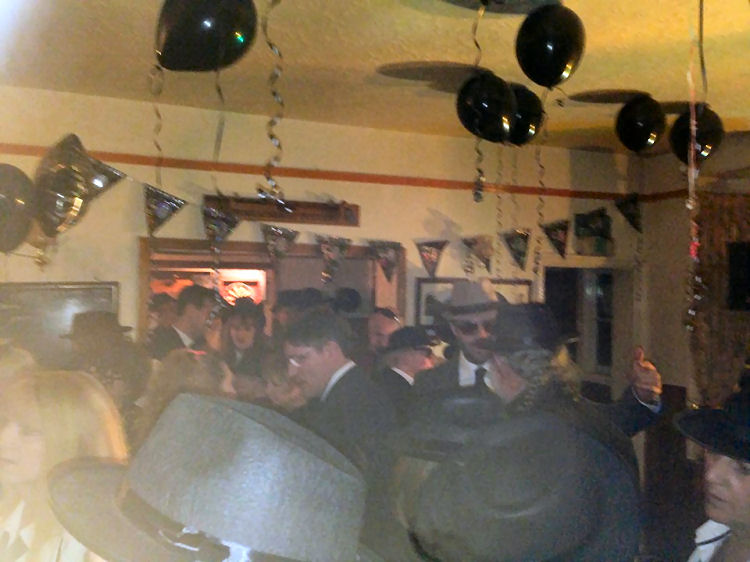
Last night at the Wheatsheaf, 9 March 2014. |
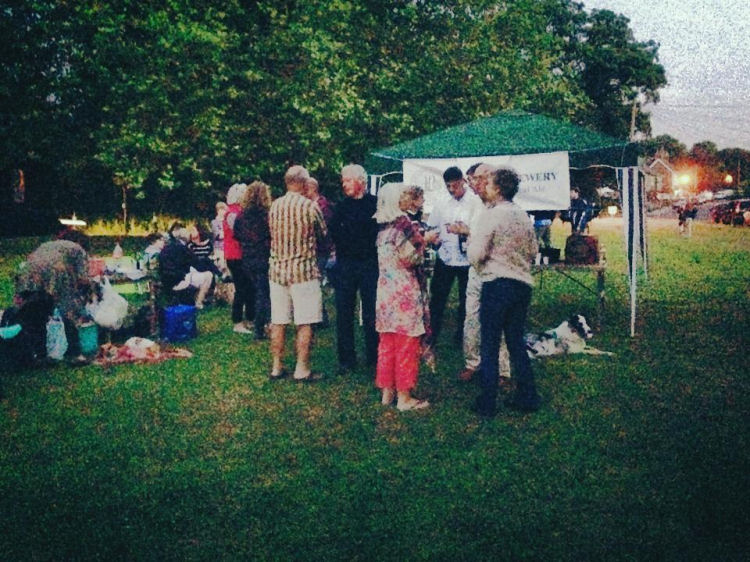
Pub on the Green get together June 2014. |
The locals followed up by trying to gain local support for the reopening
of the pub and organised an evening titled the "Pub on the Green" where they
held evenings of merriment and opened their "temporary local" outside on the
village green. Participants were encouraged to bring their own refreshments
as no licence was held. Larkin's brewery offered their help with some free
ale. They followed this up with another get together called the "Pub in the
Lane". Unfortunately the pub still remains closed today (2019).
LICENSEE LIST
BRYANT Ambrose Sept/1848-Nov/1851
(age 44 in 1851 ) )
MAY Thomas 1861-64+
(age 60 in 1861 ) )
MAY Mrs to Dec 1869 dec'd
PETERS John Dec/1869-71+
(age 25 in 1871 ) )
LONGLEY Thomas 1874-76+
BATT Elizabeth (widow) 1881+ (age 55 in 1881 ) )
DIVALL Francis 1891-1903+ (age 38 in 1901 ) )

TRINDER Charles 1911-16+ (age 31 in 1911 ) )
TRINDER Ethel Mrs 1918+
COLE John 1930
LITTLE Annie Mrs 1938+
SNELLING Stephen 1986+
https://pubwiki.co.uk/Wheatsheaf.shtml
 From the Kelly's Directory 1903 From the Kelly's Directory 1903
 Census Census
|








